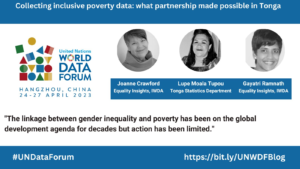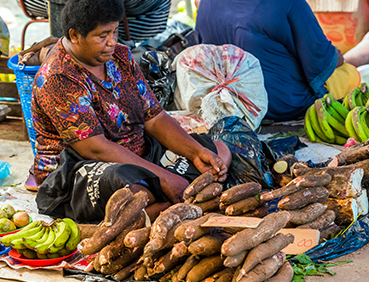Collecting inclusive poverty data: what partnership made possible in Tonga
This blog was written for the 2023 World Data Forum and first appeared on the UN Stats World Data Forum Website in May 2023.
The International Women’s Development Agency (IWDA) in partnership with the Tonga Statistics Department (TSD), and in collaboration with the Tonga Ministry of Internal Affairs, Women’s Affairs and Gender Equality Division, implemented the Equality Insights Rapid Survey in Tonga in 2022. This innovative tool has been used for implementing the first nationally representative, official individual-level, gender-sensitive measure of multidimensional poverty conducted in the Pacific region. In this blog we briefly reflect on the development of the tool and lessons learned from adaptation and implementation in Tonga. In doing so we contribute to the ‘Innovation and Partnerships for better and more inclusive data’ thematic area UN World Data Forum 2023 and the panel discussion on finding practical solutions to gender data gaps and moving gender data up the value chain.
The linkage between gender inequality and poverty has been on the global development agenda for decades but action has been limited. Part of the problem is that poverty data is predominantly collected at the household level leading to the production and use of data that is gender-insensitive. The consistent under-investment in methodological and measurement efforts relevant to gendered poverty reflect the historical lack of focus on gender inequality.
The Equality Insights program was launched by IWDA in August 2020 to accelerate action towards gender-sensitive poverty measurement. Equality Insights is an individual-level, gender-sensitive measure of multidimensional poverty that can be disaggregated to show how poverty varies for different groups based on gender, age, disability status, and other demographic characteristics. Building from earlier work on the Individual Deprivation Measure (IDM), the measure and associated survey incorporate several measurement innovations including explicit grounding in feminist principles, rights and capabilities, and lived experience of poverty, as well as within-household sampling, and scalar measurement. The measure is underpinned by 15 years of research and development, field testing and iteration, expert review and audit.
The tool underwent further innovation and adaptation during the COVID-19 pandemic and a new survey variant was developed for phone-based administration, with initial use in the Pacific. The resulting Equality Insights Rapid is a significantly shorter survey developed for use with the Computer Assisted Telephone Interview (CATI) method. The shorter survey retains key conceptual and methodological strengths of the longer face-to-face survey including individual-level data collection, assessment of fifteen dimensions of poverty plus assets, and incorporating scalar measurement, while being less detailed to achieve the concision needed for a phone-based survey.
The Pacific presents unique challenges for non-face-to-face surveying, given geography (multiple small islands), remoteness and more limited internet and mobile phone penetration compared to other regions. The eruption of the Hunga-Tonga-Hunga-Ha’apai volcano and the related tsunami that occurred in January 2022 significantly affected large parts of Tonga and these impacts had to be factored into planning and data collection. The report of the Tonga Equality Insights Rapid survey is expected to be officially launched in June 2023; we use the opportunity of the 2023 United Nations World Data Forum to reflect on key enabling elements and partnerships that underpinned implementation of this innovative tool.
Sustained commitment to gender-sensitive measurement of poverty by various actors
Implementation of Equality Insights Rapid in Tonga reflected shared commitment to gender equality and gender-sensitive measurement of poverty by all development actors. The Kingdom of Tonga has made significant national, regional and international commitments to gender equality including gender mainstreaming, addressing unequal access to economic opportunities, political representation, and participation in decision making. The Tonga National Women’s Empowerment and Gender Equality Strategy, provides Tonga’s national policy framework for gender equality, with a vision of gender equity by 2025. One of the constraints identified is the “lack of institutionalised data collection especially disaggregated data by relevant ministries.” This underpinned interest in gender-sensitive measurement of poverty, and the Tonga Statistics Department (TSD) plans to classify the Equality Insights Rapid gender data as official statistics.
The data collection in Tonga was funded by the Australian Government through the Department of Foreign Affairs and Trade, with specific focus on improving gender equality outcomes of COVID-19 recovery and response in the Pacific. This continues the Australian Government’s sustained investment to support gender-sensitive measurement of poverty since 2015. The strategic prioritisation of gender data is especially important in the Pacific where this data is limited.
Leveraging role and capabilities of partners
The partnership between a National Statistics Office and a Civil Society Organisation to collect inclusive poverty data proved to be synergistic. Since 2008, IWDA has been at the forefront of world-leading research and innovation to redefine how poverty is understood and measured. As a leader in the Pacific, the Tonga Statistics Department has significant experience in measuring multidimensional poverty and had a strong interest in leading data collection.
As the lead in-country partner for the study, TSD led the contextualising of the survey instrument, training of enumerators building from materials developed by the Equality Insights team, data collection and data cleaning. Data was collected through a call centre established at TSD which enabled close monitoring of data quality and response rates. Survey findings were subsequently validated and contextualised with a broad cross-section of data users including civil society organisations, women’s rights and disability rights organisations, and representatives from government ministries to create pathways for data use and institutional innovation.
Collaboration, commitment and trust
Post-survey debriefing highlighted the shared commitment to gender equality outcomes and strong collaboration between the teams at TSD and IWDA as the driving force behind successfully implementing the Equality Insights Rapid tool in Tonga. Even though COVID-19 meant that the engagement between teams during survey implementation was remote, the strength of relationships, trust and responsiveness created a conducive environment for a highly successful first implementation of this new survey.
Consistent under-investment in methodological and measurement efforts in gender-sensitive data has slowed progress on gender equality, constraining both understanding of barriers and gender-responsive action. Implementation of Equality Insights Rapid in Tonga demonstrates the importance of measurement innovation in strengthening the availability and use of gender data. It highlights the power of partnership to leverage shared commitments, capabilities and resources while translating innovation into practice, as a vital part of gender equality agendas.



Comments